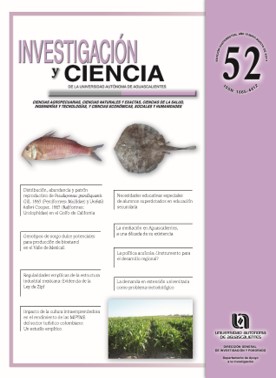The aquaculture policy: A policy tool for regional development?
DOI:
https://doi.org/10.33064/iycuaa2011524596Keywords:
Political will, institutional development, mastering the technological package, institutional building among aquicultural actorsAbstract
To materialize the considerable aquiculture potential
within the states of Mexico is not an imposible
task, provided that the correct order of the
technological package for the specie to be produced
is duly followed. The success in aquiculture
is not the result of concentrating actions pertaining
to the old economic geography (abundance
of natural resources), or in the persistence of
the belief that its innovation depends only of what
is achieved in the laboratory. On the contrary, it
is a process of independent and complementary
actions, whose starting point requires that the biological
cycle of the specie to be grown is mastered.
The following actions are intended to transfer
such technological package to the productive
sector, where it will unfold its industrial scale.
Downloads
Metrics
References
CONAPESCA, Anuario Estadístico de Acuacultura y Pesca 2008. Comisión Nacional de Acuacultura y Pesca. Mazatlán, Sinaloa, México, 2008b. De: http://www. conapesca.sagarpa.gob.mx.
FAO, VIETNAM. The Success of UNDP/FAO Project VIE/93/001 "Freshwater Fish Culture Extension". In FAO Aquaculture Newsletter -FAN-, No. 16, 28, August 1997.
FRISSELL C., Scientists Soy Real Salman Recovery Depends on lmproving Freshwater Habitat: Federal Hatchery Policy Plays Politics with Salman Science. Entrevista concedida en mayo 28, 2004. De: http://www.pacificrivers.org/about/press/releases/scientists-sayreal-salmon-recovery-depends-on-improving-fres hwater-habitat-federal-hatchery-policy-plays-politicswith-salmon-scienc.
GYLFASON, T., Natural Resources and Economic Growth: From Dependenceto Diversification. In: Sustainable Economic Liberalization and lntegration Policy: Options for Eastern Europe and Russia. Germany: organized by European lnstitute for lnternational Economic Relations (EllW), p. 34. University of Wuppertal, and held in Brussels on April 24-26, 2004.
HASAN, M., Used of feed and fertilizer for sustainable aquaculture development. Aquaculture Newsletter, No. 34. December 2005.
HU, V., La reforma económica China y la creación de empresas. Conferencia. De: http://www.uoc.edu/symposia/caixamanresa/jornadaeconomia/2005/esp/vicky_hu.pdf, 2005.
llZUKA, M., Organizational capability and export performance: the salmon industry in Chile. In the DRUID Winter Conference, 22-24 January 2004 (p. 24). SPRU, Science & Technology Policy Research. University of Sussex, 2004
KAY, C., Estructuralismo y teoría de la dependencia en el periodo neoliberal. Una perspectiva Latinoamericano. Nueva Sociedad, No. 158, Noviembre-Diciembre, Caracas, 1998.
LUNA, L. et al., El mercado de lubina y dorada en la UE en el periodo 2003-2006. De: http://www.globefish.org/ files/MercadoDoradaLubina_348.pdf.
NATHANAEL H.; ROHANA, P., Desarrollo de la acuicultura en China. Función de las políticas del sector público. México: Ed. FAO, 2003.
REANTASO, M., Freshwater Seed as Global Resource for Aquaculture. Aquaculture Newsletter. No. 34, December 2005.
SOTO, R.; MORANDÉ, F., Reformas económicas en Chile: una perspectiva institucional. De: http://www.economiaynegocios.uahurtado.cl/pdf/publicaciones/inv 121.pdf.
UNCTAD/OMC, Exportar productos pesqueros a la Unión Europea. Export Quality Boletín. No. 84, agosto de 2008.
Downloads
Published
Issue
Section
Categories
License
Copyright (c) 2011 Sergio Rosales Inzunza, Víctor Antonio Acevedo Valerio

This work is licensed under a Creative Commons Attribution-NonCommercial-ShareAlike 4.0 International License.
Las obras publicadas en versión electrónica de la revista están bajo la licencia Creative Commons Atribución-NoComercial-CompartirIgual 4.0 Internacional (CC BY-NC-SA 4.0)





